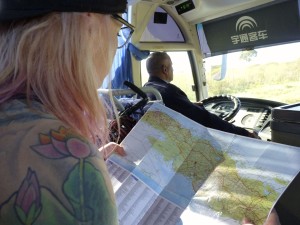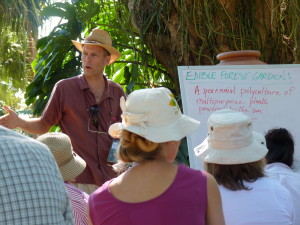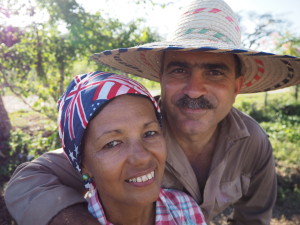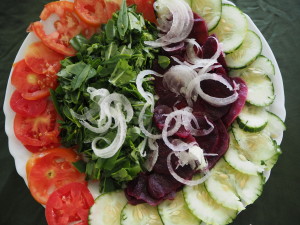Cuba’s Revolution… the Food Revolution.
The Urban Farmer, entrepreneur Ron Berezan, fell in love with a Traveling across the country from Varadero, to Sancti Spíritusand finally arriving at Santiago de Cuba student are immersed in the culture. revolution in Cuba. Not the revolution that usually comes to mind, but a food revolution, which exemplifies simple, user-friendly methods for growing organic… Read more »
The Urban Farmer, entrepreneur Ron Berezan, fell in love with a

Traveling across the country from Varadero, to Sancti Spíritus
and finally arriving at Santiago de Cuba student are immersed in the culture.
revolution in Cuba. Not the revolution that usually comes to mind, but a food revolution, which exemplifies simple, user-friendly methods for growing organic food and focuses on the limiting factor of all production – community and personal connections. All Points Land Design conducted an interview with Ron recently, where he shared his remarkable journey to an unlikely source of inspiration for the growing need (no pun intended) of permaculture and innovation.
The roots of his Vegetable origins.
Ron’s interest in permaculture began before the term was invented. His grandparents’ farm inspired a young Ron to develop an appreciation for gardening. From adolescence into his thirties, he planted seeds and grew his own food in Alberta, Canada. At some point, he presented himself with a challenge: ‘how much food could I grow in an urban area for myself and family? This quest led to Jon Jeavons bio-intensive methods of growing. While working for an NGO, a flight down to Mexico fated a chance encounter with permaculture. Reading cover to cover an issue of Permaculture Activist, focusing on the urban environment, he remembers that he “finally found his home” when the concept of permaculture planted the seed for his vocation.

Ron Berezan teaches about edible food forests in a tropical edible food forest as the background for this ‘green board’ lecture.
Yet, Ron did not know where that vocation might take him. He educated himself through his first PDC at the Kootenay Permaculture Institute and “kinda figured that nobody was gonna hire me to do permaculture.” So, he hired himself. He took a business planning course and established “The Urban Farmer” 12 years ago in Edmonton, Alberta. These humble beginnings were founded on small-scale urban designs. But, then there came a breakthrough when a cultural shift in awareness occurred. “Local food” was becoming a trend. Although Ron states that he “got really lucky” with the timing of his business, he was ahead of the curve. Ron also hustled; taking every kind of work to come his way, with the spirit of an experienced permaculture expert. After much experimenting with various aspects of permaculture, Ron’s company eventually focused on consulting, design and installation. Ron calls himself a “lefty,” as if this somehow contrasts with his strong entrepreneurial leanings (current Ron runs a boutique biochar business as well as a local nut cracking operation).
Cuba on the mind
One day, he was invited to be a panel member at the Global Vision Film Festival premiere of “The Power of Community,” a film about Peak oil and the collapse of the Cuban economy along with the collapse of the Soviet Union. The film inspired Ron to reconnect with Latin America, where he had performed much of his NGO work. He took note of the film’s credits, which included named organizations, made some calls and flew to Cuba to meet with people in the urban agriculture community.

Oscar and Marcia, Sistema Las Elenas, livestock, fruit, and veggie production. They receive approximately 80 inmates per year at their farm who are transitioning out of incarceration and back into society. Many stay on as farm employees and others find land and start farming on their own.
What he learned about permaculture in Cuba “blew him away.” He teamed up with a Cuban leader in the organic movement, Fernando Funes, who suggested that Ron bring a group with him the next time he came, so that farmers from Canada could learn from Cuba’s permaculture techniques. Ron went to work bringing the two farming communities together. First, he partnered with Organic Alberta, an organization of organic farmers, and began to form a network of growers, urban food producers, food security advocates and community organizers. These were “fantastic people doing great work,” Ron excitedly told me. Together, they designed a two-week program in Cuba to connect with Cuban farmers. They visited Cuban farm sites, ate Cuban food and learned not only about techniques, but about Cuban culture. Since then, he has made 30 trips to Cuba, taking 20 different groups with him to learn about a surprisingly efficient system of farming and, most inspiring, the cross-cultural “human connections.”
As the Cubans Do
According to Ron, Cuba’s food system is “low input, mostly organic, highly productive and diverse, and is focused on supporting the needs of the people.” It begins with the political infrastructure, which, unlike most countries, allows for urban farming virtually everywhere there is need and ability. “Their social movements contribute to the horizontal sharing of information.” The Cuban farmers “have a sense that they are doing something really important for their people.” Ron exemplifies how Cubans “work with their heads, their hearts and their hands.” This attitude had a powerful effect on the Canadian groups who visited Cuba’s urban farms, moving them personally and opening their eyes to doing their work in a different and more meaningful way.

Jardinas Bella Mar, Matanzas, started 6 years ago, community economic and social development, ecological education for regional youth, boosting local food security
Cuba’s permaculture is “a fantastic story,” which arose out of necessity in the 1990s. After Cuba’s 1959 revolution, land, buildings and enterprises were expropriated by the new government. Massive land reforms were a key part of the revolutionary governments’ first actions. But due to the aggressive American campaign of isolating Cuba, the country ended up adopting a Soviet style of big agriculture: using machine technology, chemical farming, and high inputs all supplied by their Eastern allies. When the agricultural support of the Soviet Union dried up in the late 80’s and early 90’s “the whole food system had to be redefined” in the throws of this crisis. Sugar exports continued to be high but the world market dropped due to corn fructose and US subsidies to that industry. The Cuban State had no choice but to make some radical shifts in the countries agricultural economy. For the first time in its history, Cuba began to prioritize food production for local consumption. In addition to exporting sugar for hard cash, the country began massive campaigns of organic production of fruits, vegetables and staple foods by way of cultivating small farms in urban and rural areas alike. New Cuban laws that legitimized the rapidly expanding urban agriculture sector in the early 90’s actually prohibited the use of chemicals in food production, mainly to protect agriculture by city dwellers. It dismantled large, state farms; enrolled its citizenry in massive training; and implemented biological controls and other innovations. Farming reverted to animal traction, manures, polycropping, and agroforestry. The relatively short time in which this all occurred was an “incredible thing,” Ron says. Food shortages forced people to grow their own food in urban areas or on unused land, which Cubans call “organoponicos”. This biointensive approach to agriculture began informally, but was ultimately embraced and supported by the Cuban government, and was the first experiment with self-employment in the post revolutionary period. Today, hundreds of thousands of people make their living this way.
the unique snowflake of cuba
Cuba is unique in its free allotments of land to its people who want to farm; it is literally free for the asking, including some tools, seeds, fertilizer and other start-up needs. The government works closely with its farmers to ensure stability. According to Ron, the Castros, Fidel and Raul, have even been known to telephone farmers to resolve issues or offer support in research (listen to the full interview below to hear the stories). Restrictions in urban areas and the “private property paradigm” of overdeveloped nations like Canada, create barriers to farming. Cuba already has its property and legal framework in place to support urban growers.
Cuba’s circumstances are unique; permaculture arose out of desperation stewarded by a highly resilient people, who regularly face a dramatically fluctuating tropical weather system. Highly community-oriented the Cuban permaculture community is comprised of middle-aged and older individuals. For Ron this contrasts the strong youth composition of the Canadian permaculture movement.
Through cuban eyes
Ron’s suggestions for seeing Cuba through Cuban eyes:
1) Don’t stay at a resort; stay in “Casa particulars,” family-run bed-and-breakfasts. 2) Engage with the people by taking the bus, learning some Spanish, and just introduce yourself to the notoriously extroverted community, who will be happy to share their environment with you if you approach them openly.
When asked how he got into permaculture, Ron replies: “ perhaps it’s ‘how did permaculture get into me?’ ”
where in the world is ron berezan?

Ron Berezan with two children of a local producer about to make a batch of biochar with a TLUD design.
Ron Berezan co-runs an annual 21-day Permaculture Design Certificate course in Cuba. Ron’s next trip to Cuba is scheduled for November 20, 2016 for an organic farm and holistic health focus program. The program will connect with urban farmers, permaculturalists and natural health practitioners. For those interested in a local permaculture experience, there is a site in Powell River. Information is on the Urban Farmer website: www.theurbanfarmer.ca. Ron invites direct emails at theurbanfarmer@shaw.ca.
The full hour and half interview with Ron Berezan below.



Leave a Reply
You must be logged in to post a comment.